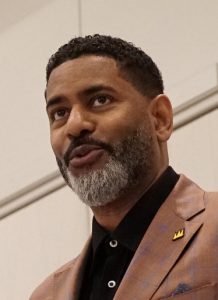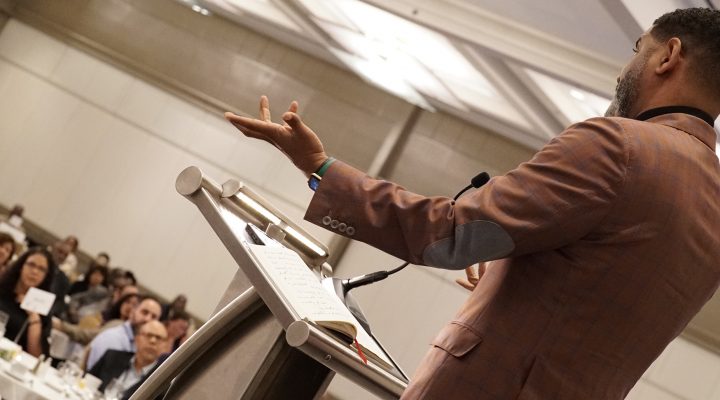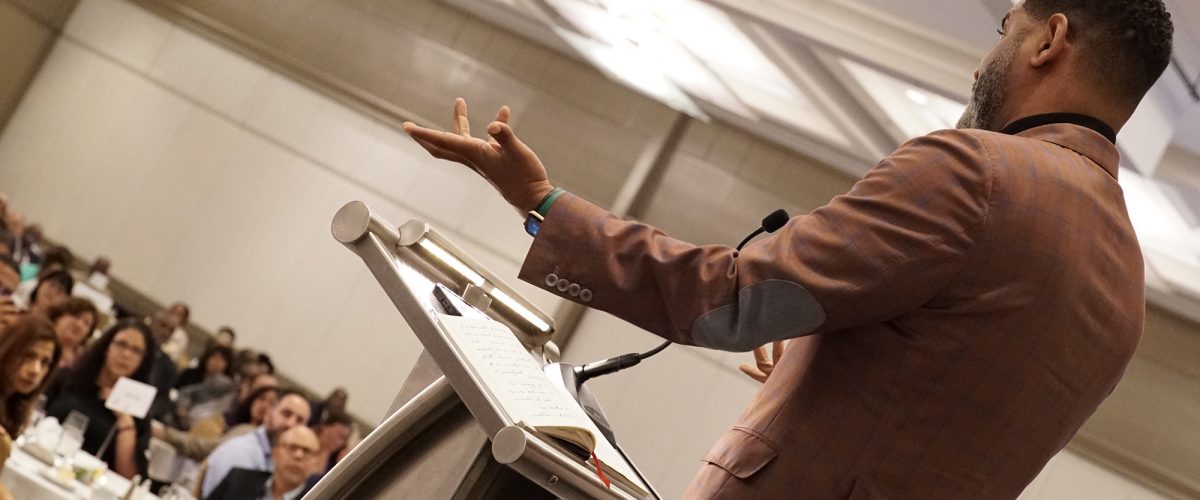Using Christian tradition and dogma to oppose women in ministry is like clinging to outdated technology to listen to music, author and pastor Otis Moss III said.
“The problem is we have 8-track churches in a streaming world, and we are wondering why we cannot reach this generation. We have to keep the message the same, but the methods need to change,” Moss preached in his June 29 keynote address at the Emmanuel McCall Racial Justice Trailblazer Luncheon during the Cooperative Baptist Fellowship’s General Assembly in Atlanta.

Otis Moss III
“Part of the challenge of the church is that we deified methodology over message. We think there is only one way. Not everybody will have a front-door ministry opportunity. Some people will come through the roof. Some will come through the window. Not everybody will connect with Jesus in the same manner,” said Moss, senior pastor of Trinity United Church of Christ in Chicago and professor of homiletics at Mercer University’s McAfee School of Theology in Atlanta.
Moss drew the analogies in his sermon from the opening passage of the second chapter of the Gospel of Mark, in which Jesus heals a paralyzed man after he is lowered through the roof of a house by four men.
The men took the action because the people in the house where Jesus was speaking refused to budge from their comfort zones, Moss said. “You have these four brothers who are bringing another brother to Jesus, but they can’t get in because the church folk are blocking the man’s blessing. Everybody already has their seat. Nobody wants to move because of the tradition and the doctrine that they’ve been functioning under.”
The modern-day equivalent includes Christians who rarely, if ever, venture from their buildings or pet doctrines for spiritual guidance, said Moss, author of Dancing in the Darkness: Spiritual Lessons for Thriving in Turbulent Times.
“I don’t necessarily want to live like Jesus. I want to hear a word about Jesus.”
“‘I’m going to stay where I am because I want to hear from Jesus,” he continued. “I don’t necessarily want to live like Jesus. I want to hear a word about Jesus. I want someone to preach about Jesus, but I don’t want to preach what Jesus preaches. So, I’m going to stay in my particular space because I’m looking for a personal blessing directly coming from Jesus.’”
The crowd’s refusal to budge also represents the inflexibility many churches demonstrate toward women as pastors and preachers, Moss said. “That is part of the challenge we witness today. Certain organizations make the claim that certain people cannot preach because they are women. ‘We will disaffiliate you if you dare let a sister preach.’ It’s interesting that God chose Mary to carry the Word for nine months, and to nurture the Word. A sister had to carry the Word before a brother could ever preach the Word.”
Theological opposition to women in church leadership also ignores the leading role women played in the Gospel accounts of Jesus’ death and resurrection, Moss said. “Before the birth of Jesus and before the resurrection of Jesus — before a brother could preach it — a sister had to say it.”
The gospel account also contains a lesson about ministry innovation as lived out by the four men who lowered the paralytic into the house, he said. “You notice that it’s not one brother trying to do all the work. You see, one brother couldn’t do the work and two brothers couldn’t do the work. But four brothers could do the work.”

Otis Moss III
Baptist and other Christian groups today should emulate the example of those four men to serve the disenfranchised and others in need, Moss added. “That’s how we can lift up the one who has the diminished capacity. Use the gifts that God has given you. And when we work our particular corner, something can happen and we can begin to transform our communities.”
Organizations like the Progressive National Baptist and National Baptist conventions, CBF, American Baptist Churches USA and the African Methodist Episcopal and Christian Methodist Episcopal churches would do well to live into that practice, Moss said.
“CBF, work your corner. PNBC, work your corner. AME, work your corner. CME, work your corner. ABC, work your corner. NBC, work your corner. Each can work their own corner saying that we’re going to carry the weight of someone who has diminished capacity and we’re going to give them to Jesus.”
Moss conceded that there are challenges to such ministry that should be embraced. “Give God thanks for the blocks, bruises and scars. Our responsibility as a community, when we see people with diminished capacity, is to lift them up. We work our corner and bring them before Jesus by any means that God deems necessary.”
The event honors Emmanuel McCall, an author, pastor and scholar revered among Southern Baptists and CBF Baptists for his pioneering work in race relations and church leadership.
Related article:
Otis Moss III found beauty dancing in the darkness


